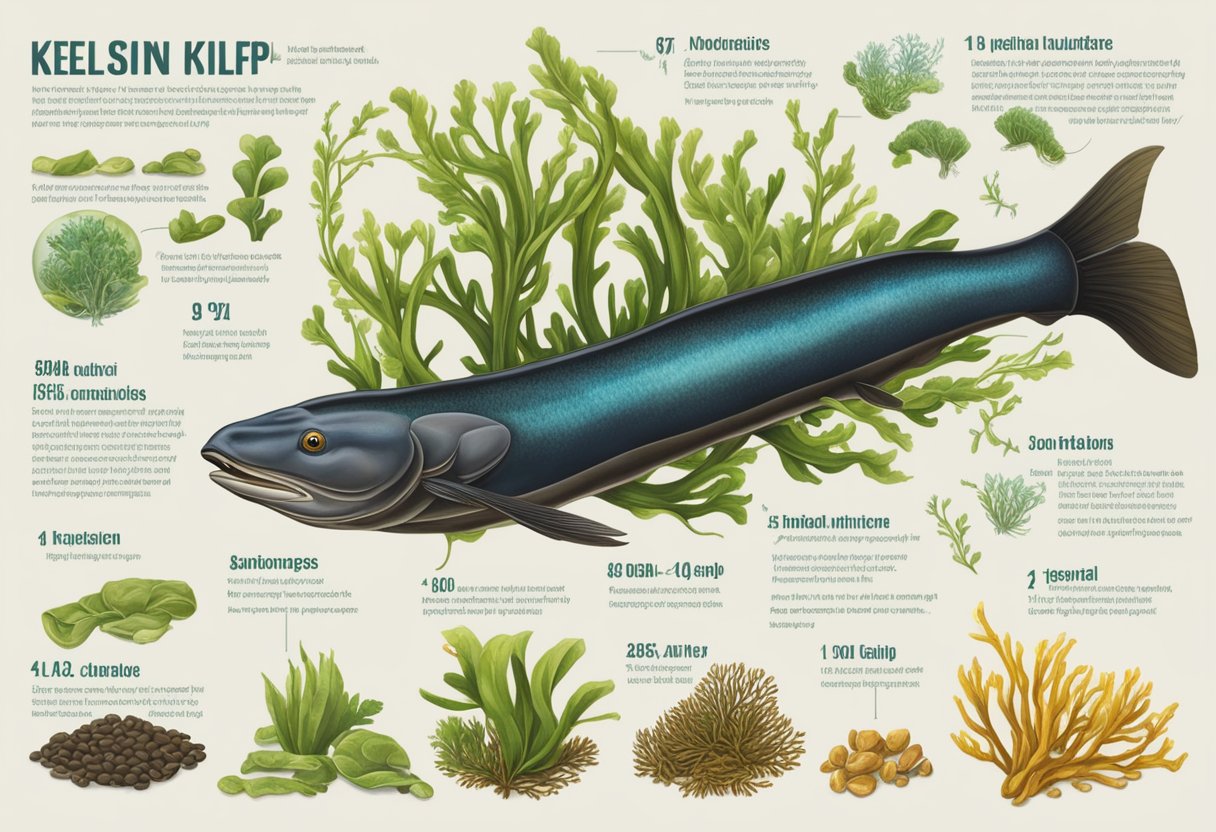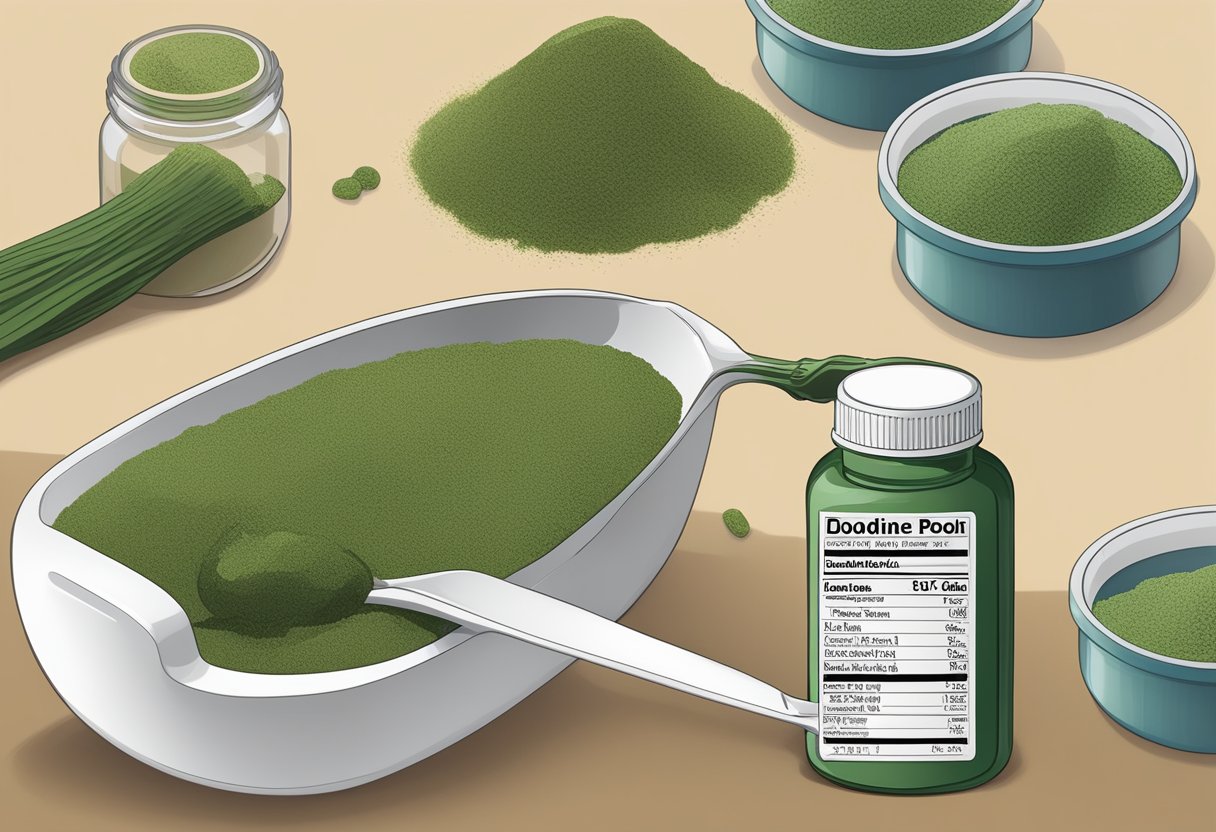Iodine is a crucial micronutrient essential for thyroid function, and it plays a pivotal role in cognitive development and metabolism regulation. Kelp, a type of seaweed, is naturally rich in iodine, and has gained popularity as a dietary supplement. The incorporation of iodine with kelp into one's diet is one way of ensuring adequate iodine intake, especially for those who have diets low in seafood and salt.
Kelp not only offers a natural source of iodine but also brings a wealth of other nutrients and health benefits. It contains a variety of vitamins, minerals, and antioxidants that support overall health. Additionally, research suggests that the compounds found in kelp may contribute positively to heart health, weight management, and even provide anti-inflammatory effects. Understanding the right dosage and considering any potential risks is crucial since both deficiency and excess of iodine can lead to health complications.

Key Takeaways
- Adequate iodine intake is important for thyroid function, and kelp is a natural source.
- Kelp delivers additional vitamins and minerals supporting overall health.
- It is necessary to monitor iodine intake to avoid potential health issues.
Overview of Iodine and Kelp

Iodine is a vital micronutrient essential for human health, particularly for the synthesis of thyroid hormones, which regulate metabolism. It is found in various food items and available as a dietary supplement. Kelp, a type of seaweed, is recognized for its high iodine content. Consuming kelp can support the health of individuals who may not get sufficient iodine through their diet.
Kelp-derived iodine presents several benefits. It is natural and often accompanied by other minerals and vitamins found in marine plants. Here's a concise representation of its advantages:
- Thyroid Function: Helps in the maintenance of normal thyroid function.
- Cognitive Health: Adequate iodine is associated with cognitive health.
- Developmental Benefits: Crucial for the neurological development of fetuses and infants.
- Metabolic Regulation: Plays a role in supporting metabolic activity.
Despite the nutritional value of iodine from kelp, one should be cautious not to consume it excessively, as it might lead to an imbalance and thyroid dysfunction. Monitoring intake is necessary, as individuals' iodine needs vary.
Here are the recommended dietary allowances (RDAs) for iodine based on age and life stage:
- Birth to 6 months: 110 mcg
- 7-12 months: 130 mcg
- 1-8 years: 90 mcg
- 9-13 years: 120 mcg
- 14 years and older: 150 mcg
- Pregnant women: 220 mcg
- Breastfeeding women: 290 mcg
Incorporating kelp as an iodine source can be beneficial, but it should be sourced responsibly to ensure purity and sustainability. It is important for consumers to verify the quality and origin of kelp supplements to avoid contaminants.
Health Benefits of Iodine With Kelp

Iodine is an essential micronutrient, and kelp is a natural source abundant in this element. Together, they provide synergistic benefits crucial for maintaining various aspects of health.
Thyroid Function Support
The thyroid gland relies on iodine to produce hormones that regulate metabolism, growth, and development. Iodine from kelp supports this function, making it a valuable dietary component for maintaining a healthy thyroid.
Cognitive Health
Iodine plays a vital role in brain development, especially during pregnancy and infancy. Regular intake of iodine with kelp can support cognitive functions such as learning and memory throughout life.
Metabolic Efficiency
By supporting thyroid health, iodine with kelp contributes to a more efficient metabolism. This can affect energy levels and body weight management, as the thyroid hormones are key regulators of metabolic rate.
Nutritional Profile of Kelp

Kelp is a nutrient-rich seaweed known for its high content of essential vitamins and minerals. It also has notable levels of dietary fiber, making it a valuable addition to a healthy diet.
Vitamins and Minerals
Kelp contains a wide array of vitamins and minerals, crucial for maintaining good health. Specifically, it is an excellent source of iodine, which is vital for thyroid function. The potency of iodine in kelp can vary depending on the species and environmental conditions. Additionally, kelp offers ample vitamin K, essential for blood clotting, and folate, necessary for DNA synthesis and repair. Here is a list of key vitamins and minerals found in kelp:
- Iodine: crucial for thyroid health
- Vitamin K: aids in blood clotting
- Folate: important for cellular function and tissue growth
- Calcium: supports bone and teeth strength
- Magnesium: involved in over 300 biochemical reactions in the body
- Iron: essential for oxygen transport in the blood
Moreover, trace amounts of zinc, copper, and selenium can also be found in kelp, contributing to a range of health benefits from immune function to antioxidant protection.
Dietary Fiber Content
Kelp is also a good source of dietary fiber. Fiber in kelp helps support digestive health and can contribute to a feeling of fullness, potentially aiding in weight management. The type of fiber present in kelp is mostly soluble, which has benefits for cholesterol levels and cardiovascular health. The following outlines the fiber content in kelp:
- Total Fiber: Amounts can vary, typically around 1.3 grams per 100 grams of kelp.
- Soluble Fiber: Beneficial for maintaining healthy cholesterol and blood sugar levels.
Recommended Dosage and Intake

When considering iodine supplementation with kelp, it is vital to consult with a healthcare provider to determine appropriate dosing. Kelp, a type of seaweed, contains naturally high levels of iodine. However, iodine content in kelp can vary widely, and excessive intake may lead to health issues like thyroid dysfunction.
Adults: The recommended dietary allowance (RDA) for iodine in adults is 150 micrograms (mcg) per day. Pregnant and lactating women require higher amounts, around 220 mcg and 290 mcg per day, respectively.
Kelp Supplements: If opting for kelp supplements, one should not exceed the RDA unless advised by a healthcare provider. Supplements often provide iodine in varying amounts, sometimes above the RDA.
Safe Intake Guidelines:
- Check supplement labeling for iodine content per serving.
- Monitor total daily intake from all sources to stay within recommended limits.
- Be cautious of high-potency products; they may contain much higher amounts of iodine than necessary.
It is essential to note that some people may be sensitive to iodine. Symptoms of excess intake include swelling of the thyroid gland and thyroid dysfunction.
Lastly, the quality of kelp supplements can differ. Look for products that have been tested for contaminants and accuracy of iodine content.
| Population Group | Recommended Iodine Intake (mcg/day) |
|---|---|
| Adults | 150 |
| Pregnant Women | 220 |
| Lactating Women | 290 |
Adherence to these guidelines ensures that iodine is consumed safely, reducing the risk of adverse effects associated with improper dosage.
Potential Risks and Considerations
While iodine is an essential nutrient and kelp is a natural source of it, they must consider potential risks and take precautions to avoid negative health impacts.
Interaction With Medications
Iodine from kelp can interact with certain medications, which may alter their effectiveness. For instance:
- Thyroid medications: Kelp may affect thyroid hormone levels, impacting the efficacy of thyroid medications.
- Blood thinners (anticoagulants): Iodine may influence blood clotting, and therefore, could interact with anticoagulants such as warfarin.
Overconsumption Effects
Consuming excessive amounts of iodine from kelp can lead to several health issues, including:
- Thyroid dysfunction: Overconsumption may cause thyroid gland inflammation or hyperthyroidism.
- Iodine toxicity: Symptoms can range from stomach pain to serious conditions like thyroid papillary cancer.
Daily intake recommendations should not exceed:
- 150 µg for adults
- 220-250 µg for pregnant or breastfeeding women
Overconsumption risks are heightened when consuming supplements or concentrated forms of kelp.




